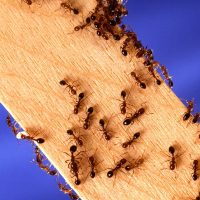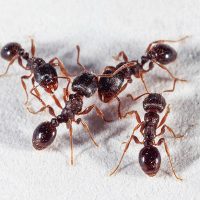
Ants are the most numerous insects in the world and the top nuisance in America, which comes as no surprise seeing as they are frequent visitors to our homes. Ants have the whole world under their feet, so why are they invading our homes? We have compiled a list and explanation of what ants are looking for in your home and ways you can prevent ant infestation.
Why Are There Ants in my House?
The number-one reason an ant is attracted to your home is food. Ants have to eat, and they will eat anything. An ant eats about 30% of their body weight each day. An entire colony consumes about 4.5 pounds of food daily.
What do Ants Eat?
The tiniest crumbs and spills are enough for these tiny soldiers to find, and they tell everyone back in the colony about it too. The pheromones ants leave guide all their fellow workers to the source. Ants are intelligent creatures and use their physical and mental strengths to best serve their colony.
What do ants eat?
- Carbohydrates and sugar—but not artificial sweeteners. Juices, fruits, or bread are good examples.
- Salt—sometimes salt can be an equal or greater attractant for an ant than sugar.
- Ants are omnivores—some are even cannibals and eat their own eggs and larvae.
Are Ants Attracted to Water?
Water is a universal necessity of life, and this applies to ants too—so the leaks, drips, and condensation in and around your home may be reasons why ants are in your home. That said, not all ants like large amounts of water—depending on the species, some ants prefer dry climates. Carpenter ants are attracted to damp wood, such as firewood or water-damaged wood, however.
How to Prevent Ant Infestations
- Keep your dining areas restricted
- Make sure dining areas always get cleaned after a meal or snack.
- Seal food in containers
- Keep an eye on fruit and throw it out before it attracts ants and pesky fruit flies.
- Check your faucets and sink systems, bathrooms, kitchen, A/C unit, etc. to fix any leaks or issues.
Common Types of Ants in Alabama
Carpenter ants, Odorous-House ants, and Pavement ants were found by the National Pest Management Association to be the three most damaging and bothersome pest ants in America. It’s important to know a bit about these insects, so you can employ the proper prevention methods and know what kind of damage is being done in the event of an infestation.
Carpenter Ants

Carpenter Ants are a danger to your home structure. They, as the name implies, chisel away at the wood in your home. They don’t eat wood, like termites, but these ants drill their way through wood structures to make new nesting sites and trails. Carpenter ants come in various sizes and colors, but they all have the same excavating behaviors. The nests they build in your home are only secondary to the main base located outdoors.
Odorous House Ants

Odorous House Ants, named for the strange scent released when squished, create many temporary nests that can be found under pieces of wood, debris, rocks, etc. While these ants are just highly obnoxious to have around, they are hard to control and get rid of because of their nomadic nature. Their colonies are huge, consisting of multiple queens, in various places in/around a foraging site. Professional Pest Control Specialists will be best to end your odorous house ant problem.
Pavement Ants

The third most pesky type of ants is pavement, or mason, ants. These insects are a double threat: like the carpenter ants, they bore their way to food and similarly to the odorous house ants they have multiple queens and build nests in/under concrete and rocks. These ants have stingers and are usually one size. Their many queens and underground nests make them difficult to manage. They are often found under concrete patios, sidewalks, driveways, and basements. Pavement ants when nesting, move the substrate and can cause damage to your property.








